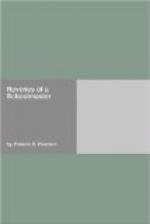I have but the most meagre acquaintance with the pedagogical dicta of the books—a mere bowing acquaintance—but, at that time, I had not even been introduced to any of these. But, as the saying goes, “The Lord takes care of fools and children,” and, so, somehow, by sheer blind luck, I instinctively veered away from the Procrustean bed idea, and found some work for my bewhiskered disciple that connected with his native dispositions. Had any one told me I was doing any such things I think I should, probably, have asked him how to spell the words he was using. I only knew that this man-child was there yearning for knowledge, and I was glad to share my meagre store of crumbs with him. His gratitude for my small gifts was really pathetic, and right there I learned the joys of the teacher. That man sought me out on our way home from school and asked questions that would have puzzled Socrates, but forgot my ignorance of hard questions in his joy at my answers of easy ones. When some light would break in upon him he cavorted about me like a glad dog, and became a second Columbus, discovering a new world.
I almost lose patience with myself, at times, when I catch myself preening my feathers before some pedagogical mirror, as if I were getting ready to appear in public as an accredited schoolmaster. At such a time, I long to go back to the country road and saunter along beside some pupil, either with or without whiskers, and give him of my little store without rules or frills and with no pomp or parade. In that little school at the crossroads we never made any preparation for some possible visitor who might come in to survey us or apply some efficiency test, or give us a rating either as individuals or as a school. We were too busy and happy for that. We kept right on at our work with our doors and our hearts wide open for every good thing that came our way, whether knowledge or people. As I have said, our work was elemental.
I am glad I came across this little book of William James, “On Some of Life’s Ideals,” for it takes me back, inferentially, to that elemental school, especially in this paragraph which says: “Life is always worth living, if one have such responsive sensibilities. But we of the highly educated classes (so-called) have most of us got far, far away from Nature. We are trained to seek the choice, the rare, the exquisite exclusively and to overlook the common. We are stuffed with abstract conceptions, and glib with verbalities and verbosities; and in the culture of these higher functions the peculiar sources of joy connected with our simpler functions often dry up, and we grow stone-blind and insensible to life’s more elementary and general goods and joys.”




